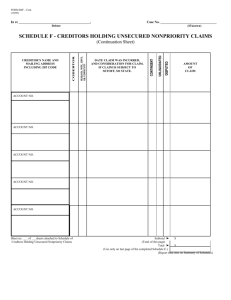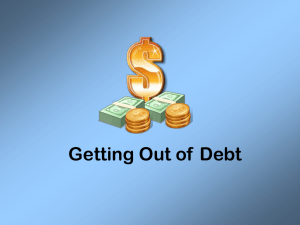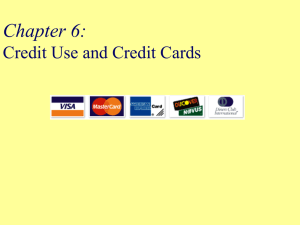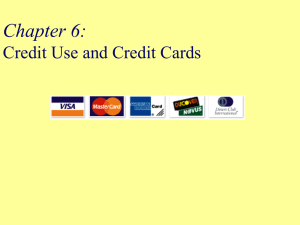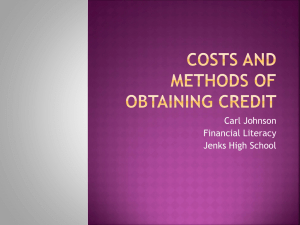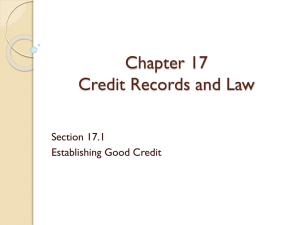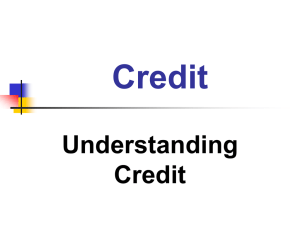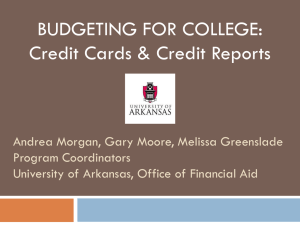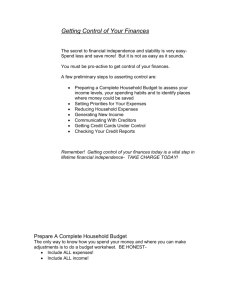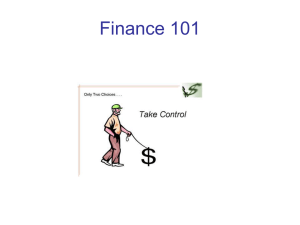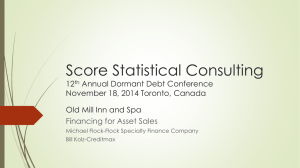Educational Program 3 - Live Debt Free with Elite Financial Services
advertisement
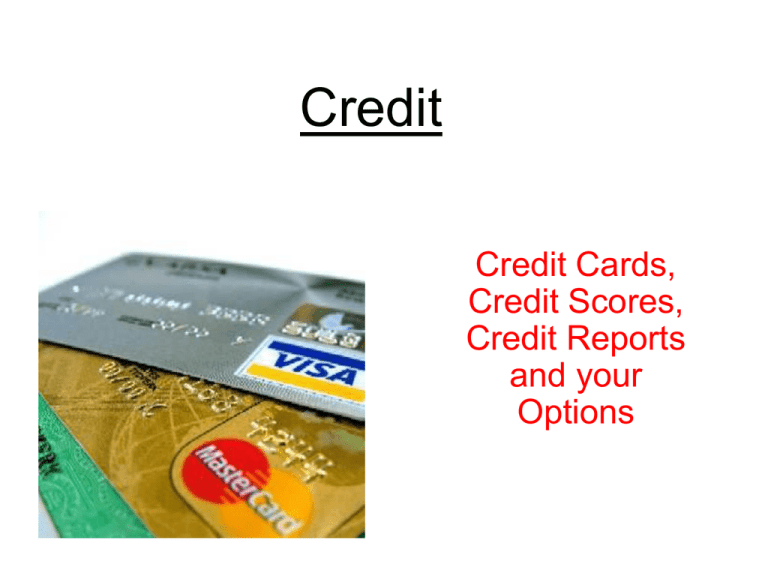
Credit Credit Cards, Credit Scores, Credit Reports and your Options Introduction • Credit is when you receive an asset (cash, car, house, etc) and plan to pay for it in the future. • It allows people to purchase goods that they otherwise could not afford. • However, it also costs more over the long run as the balance is paid back plus interest Examples of Credit • • • • • • • Credit Cards Car Loans Home Mortgage Personal Loans Home Equity Loans Students Loans Department Store Cards (Macy’s) Quick Facts • 180 million Americans • 76% of college had at least one credit students have at least card at the end of one credit card 2008 • The average balance • There were over 1.5 on these cards is over billion cards in the $2,000, to go along USA at the end of with an average of 2008 $20,000 in student loans Credit Terms to Know • • • • • Creditor: The party that makes the loan Debtor: The party that receives the loan Installment Debt: Any debt where the debtor makes regular payments to a creditor for longer than 10 months (car loans) Mortgage: Used to purchase homes. Typically this is spread out over 30 years, but shorter terms are available. Consolidation Loan: This is a loan that is used to pay off other bills that have a higher interest rate than the new loan will carry. Credit Terms to Know Continued • Credit score: A number from 300-850 that grades your credit worthiness • Credit Report: A complete history of all your debts. This form is used to calculate your credit score Credit Cards and Your Options • • • By far the most common type of credit in the USA, credit cards can be a convenient source of credit if used correctly The first option you have is whether to get a secured or unsecured credit card. Secured cards are good for people trying to rebuild their credit. These cards have higher interest rates and more restrictions as the consumer tends to be a bigger credit risk Unsecured cards are the most common form, but also the most dangerous. These have higher credit limits, less restrictions, and lower fees. If not used responsibly, unsecured credit cards can quickly create a mountain of debt that is hard to eliminate in the future Basic Information • • • Credit cards are a convenient way to purchase goods and can in fact save you money if used correctly. Your interest rate will vary according to your credit score and payment history. The first time you are late on a payment, your rate will jump. It is quite common for a consumer to pay 30% interest if he has missed a few payments or been late. Just because it is convenient doesn’t mean it’s the right choice. Credit card companies are in the business of making money, and you the consumer is how they do that. Credits Cards and You • • • • So why should you get a credit card? Getting a credit card at age 18 can be very beneficial. It can start to build your credit history which will show future lenders that you are responsible with money. It can minimize your need for cash, which means you won’t be able to spend those last $2 in your pocket on McDonalds when you drive by it after school Most importantly, the sooner you learn to use credit cards responsibly, the lower the chances are of you ending up in debt and making minimum payments for the next 10 years on a 65 inch LCD TV you couldn’t afford in the first place. Why You Shouldn’t Get a Card • • • To live beyond your means. If you want to go on Spring Break when you are 21, start saving now. Save $40 a month and in 3 years you will have close to $1,500 to have the vacation of your dreams. Don’t use a credit card to charge the trip and pay back double the original balance over 5 years To pay last months bills. If you don’t have the cash to pay your bills each month, cut down your expenses or raise your income to make ends meet. If you don’t have good self control, a credit card is an invitation to excessive spending that can ruin your early adult years with mountains of debt and worries about your financial situation. Common Mistakes • • • • Introductory interest rates are used to enroll you into the program and then within a short period of time the rate will dramatically rise. Rewards programs are very common nowadays, but studies have shown that rewards programs don’t benefit the customer and in fact cause them to spend more than they normally would What if you pay off your debt each month? Well, studies have shown that consumers spend 30% more when using credit cards versus cash because of the convenience and delayed costs associated with buying goods on credit. You go into Wal-Mart to get some soda and end up coming out with Pizza, an Xbox game, and soda for example. Paying the minimum each month is still fairly common. However, new rules enacted in February of 2010 will hopefully change things. Credit card statements are now required to show how long it would take to pay off your debt if you only paid the minimum. This will allow you to see just how long that new TV will cost you, paying only the minimum Pros and Cons • Convenience • Extra perks like cash back or airline miles • Perfect for emergencies you could face such as running out of gas for your car or buying that Celtics ticket you have wanted since the season started (Just Kidding) • Can lead to spending more than you can afford • Eliminates the feeling off loss while giving you instant gratification • Irresponsible spending can lead to a lifetime of debt • Missing a payment by accident can harm your credit score Your Credit Report • Your credit report is a snapshot of your financial history • Creditors use your credit report to determine if you are able and willing to pay back a loan • Most items appear on your report for 7 years, but bankruptcies usually stay on the report for 10 years General Information • There are three main credit bureaus in the USA. Your creditors provide the data to the bureaus while public records are researched by the bureaus themselves. • It is important to note that the bureaus do not verify or check the information provided, which is why close to 85% of Americans with credit have had or will have a mistake on their report at some point in their lives. This is why it is important to check your credit report annually for free at annualcreditreport.com. • Each bureau has a unique mathematical formula which is why your credit score can be different for each credit bureau. • Although each report is different, the three bureaus do all include 4 basic groups of information on their reports. The Information on Your Report • Each report has your identifying information in the first section. This includes your SS #, home address, date of birth, as well as your full legal name. This information is used to make sure the data on the report is yours, and not someone with a similar or identical name. • • • The next group is your credit history. This group includes all the information on your accounts, including balances, credit limits, dates opened, as well as your payment history for each account. Late and missed payments also show up here as negative marks. • The third group in your credit report is the inquiry section. • This lists all the times your credit report was accessed by creditors. Every time you apply for a loan or credit card, the creditors run your report to see if you are credit eligible. • The more you apply for credit, the less appealing you are to lenders. This is because creditors see you as someone who is looking for more credit to make ends meet. • Keep in mind that checking your own credit report does not show up on your report and does not hurt your credit score • The final section is the Public Records section. • This section includes any public information items that future creditors need to know about to grade your credit worthiness. • Public records include information like bankruptcies, judgments, tax liens, state and country court records, and, in some states, overdue child support. Your Credit Score and Why its Important • • • Your credit score is basically grading you on how well you manage debt. It puts into numbers the likelihood of paying back your creditors in full and on time. The most popular type of credit score is called the FICO score, which was the first one developed in 1956 by Fair Isaac & Company. It has a range from 300 to 850. Creditors use this number to make a business decision regarding your application for a line of credit. The higher your score, the more likely you are to receive the credit line and the more favorable the terms are associated with the credit line (lower interest rate). The 5 Factors that Affect your Credit Score • • • • Your credit score is calculated using five different factors. The first factor, which makes up 35% of your score, is your payment history. Payment history information includes the history of each account, the presence of negative public records (suits, bankruptcy, judgments), late payments, the severity in time of a delinquency, as well as the balance on accounts that are delinquent. As you can see, not being punctual with your payments can drop a score dozens of points • The second factor that makes up 30% of your score is the amount you owe. • However, it’s not the total debt that matters, but the amount of credit you are using each month in comparison to how much you have access to. • Credit bureaus look favorably upon people who use less than 30% of their available credit on any account. • Keep in mind, any single account with a credit utilization ratio higher than 30% can hurt your credit score. • • • The third factor that affects your credit score is the length of your credit history, which makes up 15% of your score. The length of your history with each lender is looked at, with a longer relationship being favored by the bureaus over shorter ones. This is why it’s important for young people to begin building their credit as soon as possible. Your first car could end up costing you more in interest if you have no history of making your monthly payments on time. • • • The fourth factor that determines your credit score is the amount and type of new credit you have. This makes up 10% of your score Applying for multiple new lines of credit in a short period of time can hurt your score because the bureaus will assume that you are in a bad financial decision and need more credit to get by However, the type of credit being applied for makes a big difference. An application for a home mortgage is not seen as a negative, as long as you have the finances to support such an application • The fifth and final factor is the type of existing credit being used. This makes up about 10% • The number and types of existing and past credit on your report can either negatively or positively affect your score. • If you have more credit cards than the average person or multiple car loans you will be seen as a higher credit risk and thus will have a lower score. Suggestions for YOUR Future • Use credit correctly when you are young, and you will reap the benefits for the rest of your lives. • Don’t use credit cards to buy things you can’t afford. • Pay as much as you can each month! Paying only the minimums will make that $100 dress cost $300 or more in the long run. • The sooner you create a budget and spend less than you make, the better off you will be. • Once you have a credit history, make sure you check your credit report each year for mistakes and fraud • Follow the rules mentioned earlier and you will maximize your credit score which will lead to lower interest rates on your credit cards, car loans, and even home mortgages. Q&A Exam What is credit? Credit is when you receive an asset (cash, car, house, etc) and plan to pay for it in the future. What is a Creditor? What is a Debtor? The party that makes the loan The party that receives the loan What is a credit score? A number from 300-850 that grades your credit worthiness What is the difference between secured and unsecured debt? Unsecured debt has no collateral to protect the creditor while secured debt has some form of collateral to compensate the creditor if you default on the payments. Exam Page 2 What are some common mistakes of new credit card users? Introductory interest rates, rewards programs, spending more than you otherwise would, and paying only the minimum What are some good reasons to get a credit card? Convenience, perks/rewards, building up your credit history, and emergencies What are some bad reasons to get a credit card? To live beyond your means, to pay last months bills, and if you don’t have good self control Exam Page 3 What are the 4 Sections of a credit report? What 5 factors make up the credit score? ID section, credit history section, inquiry section, and public records section Payment history, amount owed as a percentage of total credit limit, length of credit history, amount and type of new credit, and types of existing credit being used The End
